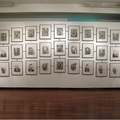I have hazel eyes. My skin is pale, my nose is tall and my hips are hopelessly wide. At first glance there is nothing about me, or so I am constantly told, that looks remotely Japanese. This is why he wanted to take me out of the shot. I heard him utter the recurring phrase of my life, the one that was born in the mouths of the children at Hiroba Koen and echoed to lips of an up and coming film director in New York City on the set of a big budget feature.
“She doesn’t look Asian enough.”
They had already sent back Crystal, the other Hapa actress on set, downstairs to holding for the same reason. Crystal and I had both been hired by responding on a whim to this ad posted on a local breakdown services site:
Urgently Seeking:
Background Talent: Asian female actors, 20-30’s. Must be attractive model-types with great body. Talent must be available to work for the two-day shoot.
Since the talent consisted mostly of petite Asian model-type girls, Crystal and I were doomed to stand out. Even upon arrival, an overweight and seemingly stressed out P.A. looked me up and down, raised his eye brown and said, “What are you doing here?”
“What do you mean?” I replied, even though I already knew the answer.
“Well, I mean, I thought this casting was supposed to be for Asian girls.”
“I’m half Japanese.”
“Oh, no kidding. You don’t look it.”
“Okay,” I said. Wondering why they would cast me if I didn’t “look it.”
“Wow,” he sighs, “they must have been really desperate.”
“Excuse me?”
“No, I mean, there must not be that many Asian girls in the city. Don’t get me wrong you know. I guess now that you say something you kind of look Asian. Your eyes maybe. You wouldn’t look Asian at all if it weren’t for your haircut.” I gave him a blank stare. “Why are you looking at me like that? I’m in the casting business. This is how we think.” Oh no, I thought. It was going to happen again. The recurring theme of my life. He was going to analyze my face.
“My haircut?”
“Yeah…I mean you got those Asian bangs you know. It makes your eyes look more slanty. But you’re tall…you look more Russian or Icelandic or something. You kinda look like Danica whats-her-face. You know, from The Wonder Years? Yeah, you totally look like her. She was white. You remember that show? Anyway, what’s your dad’s side of the family? He’s not Asian right? It’s your mom right?”
“How did you know?”
“It’s hardly ever the dad. You know how it is. Asian women go for the white guys.”
“German,” I said, “My dad’s side of the family is German American.”
“Guttentag.”
“What?” I ask.
“Did I say that right?”
“I don’t speak German. I said my dad was German American. He’s from America.”
“How about Konnichiwa?”
“That means good afternoon,” I sigh.
“You speak Japanese?”
“Yes.”
“No kidding!”
In an industry that thrives on stereotypes, artists are bound to run into racial profiling at some point in their careers. But a person who has a biracial identity, which is rarely recognized as an identity on its own, will have more instances where an aspect of his/her entire being is completely disrespected or disregarded with complete ease. Many times I am left to wonder at the audacity of others when they feel one hundred percent comfortable giving racially charged observations to a Hapa that they would never say to someone with one specific ethnic background. I have experienced a wide array of instances such as these, everything from a good friend informing that the only reason I was scoring opportunities in the big city was because of my not too Asian/not too white “thing” I have going on (and how hard it was for his middle class white girlfriend to even get a job at Starbucks because she wasn’t a minority), to watching a casting agent brush me off in disgust when I tell him I am fluent in Japanese, that it “doesn’t matter” because I don’t “look it.”
Crystal has her own stories. We bonded during the fourteen hours of shooting, laughing at ourselves as we collected our SAG waivers and stuffed our faces at Craft Services in Prada dresses we would never be able to afford. She is a beautiful actress, model, and host who markets herself as all of the races that are in her blood. She tells me a story of an encounter she had with a casting director who was seeking Asian and Latino women for a commercial.
“I submitted myself for the commercial, and he shoots me an email back right away. I thought, well, this is good news – he’s getting back with me. But then I open my inbox and it says—Come on Crystal. Give me a break. You know you’re not Asian or Latino.”
The other end of the spectrum is equally confusing. Every once in a blue moon, I come across a casting call where the type of “best of both worlds” exoticism is specifically requested and glorified. Observe the listings below:
Seeking:
Models: Eurasian females, 18-28, 5'6" or taller. Models should be attractive model-types who are thin and in great shape. A Eurasian beauty is a mix of European and Asian descent. Must look upscale. (Side note: I frantically submitted as a “Eurasian Beauty” but needless to say, did not get picked so I presume I am not one of these).
Or this:
National Wholesale Liquidators Commercial
Spokesperson: Mixed-race female, late 20’s–late 30’s. Must look ethnically ambiguous. “Full-breeds” will not be considered. Must be well spoken and attractive.
In a world where people are carelessly referred to as “breeds” how do we give our own breed a name and an identity that won’t be disregarded? Though innumerable Americans still have never heard of the word “Hapa” nor seem to care, a sort of optimistic revolution, so-called “new” generation of mixed races has already begun to flood the globe. No matter what industry we are in, we must stay true and stand up for our identity and be recognized as a unified force. There is a certain insecurity harbored among many of those who grew up celebrating both the Fourth of July and Kodomono Hi, simply because, along with the best of both worlds, come the worst of both worlds; racial tension, hate and anger. The good news is, as opposed to a decade ago, when the Asian descent of such actors as Dean Caine and Mark Paul Gosselaar were downplayed in order for them to fit the mold of their “All American” characters on TV, we now have a biracial candidate running for presidency and the face of America is changing. The cliché blonde hair blue eyed fat man eating potato chips on the couch is diminishing as we struggle and embrace our identity and represent the beauty of the melting pot.
******
I am back in holding on day two of the shoot. Crystal decided not to return the second day and I feel awkward in my low cut dress, munching on peanuts by myself by craft services. There is a tap on my shoulder and I see Terrence Howard, a lead actor in this particular feature film, staring at me with his green blue eyes.
“What nationality are you?” he asks.
Slightly star struck and in awe of the fact that someone famous is talking to me, I search for the right words.
“Half…Japanese? What nationality are you?”
Terrence Howard spurts out a cocktail of different ethnicities that I won’t even consider repeating.
“Wow. So...um, you’re kind of a mutt,” I say.
“Nope,” he says. “I’m Terry.”
As atrocious as that sounds, he’s got it right.
© 2008 Leah Nanako Winkler





